Cortisone & Frozen Shoulder

We know corticosteroid injection(s) is a proven treatment strategy for adhesive capsulitis.2
The specific location of the corticosteroid injection has been shown to influence outcomes. Glenohumeral joint intra-articular (IA) corticosteroid injections have been shown to be effective for patients with adhesive capsulitis.8,9 IA injections with corticosteroid have also been shown to be effective in the diabetic population.6
Rotator interval injection (RI) has been shown to be superior, in the short-term, compared with IA and subacromial (SA) injections.3
The efficacy of corticosteroid injection into the SA space has been shown to be inferior to IA injection in the immediate short-term and longer-term follow-up.4,5,11 A meta-analysis of randomised controlled trials also demonstrated that IA injection of corticosteroid was associated with an improved outcomes for pain relief compared to subacromial injection.12 However, combination of IA and SA injections has been shown to have an additive effect.4 Multisite injection technique has been shown to be superior compared with a single-site injection with pain relief and early improvement in activities of daily living.13,14
The optimal dose of a single corticosteroid injection has also been investigated. One study demonstrated no significant differences between the high- (40 mg methylprednisolone) and low-dose (20 mg methylprednisolone) corticosteroid groups.7
On the other hand, a study conducted by de Jong et al.10 found that high-dose (40 mg methylprednisolone) intra-articular injection was found to be more effective than low-dose (10 mg methylprednisolone) in patients with capsulitis of the shoulder.
A systematic review of randomised trials using multiple injections found that no trial compared single versus multiple corticosteroid injections.15 However, out of the nine randomised controlled trials that were identified, three high quality studies showed a beneficial effect for the use of multiple corticosteroid injections with outcome measures of pain reduction, improved function, and increased range of shoulder movement.
One prospective randomised trial of three treatments--distension only, steroid only, and steroid with distension--with three intra-articular injections into the shoulder given at six week intervals.16 Another study investigated a low dose vs high dose suspension but both groups were given a course of three injections.10 Finally, one study examined two different treatments (steroid alone and distension combined with steroid) where patients received one treatment per week for a six weeks period.17
A systematic review and meta-analysis aimed to compare the efficacy of high-dose (full-vial) and low-dose (half or quarter-vial) steroid injections in treating adhesive capsulitis. The study included 4 randomized controlled trials with a total of 274 patients. The analysis found no significant differences between high-dose and low-dose steroid injections in terms of pain relief, range of motion improvement, or functional outcomes at 3 weeks, 6 weeks, and 1 year post-treatment. While these findings suggest that low-dose steroid injections may be as effective as high-dose injections for frozen shoulder, the authors note that more research is needed to confirm these results due to the limited number of studies available.18
Cortisone injections are generally effective for treating frozen shoulder, particularly in the short term. Multiple studies have shown that intra-articular corticosteroid injections can provide significant benefits for patients with adhesive capsulitis (frozen shoulder).
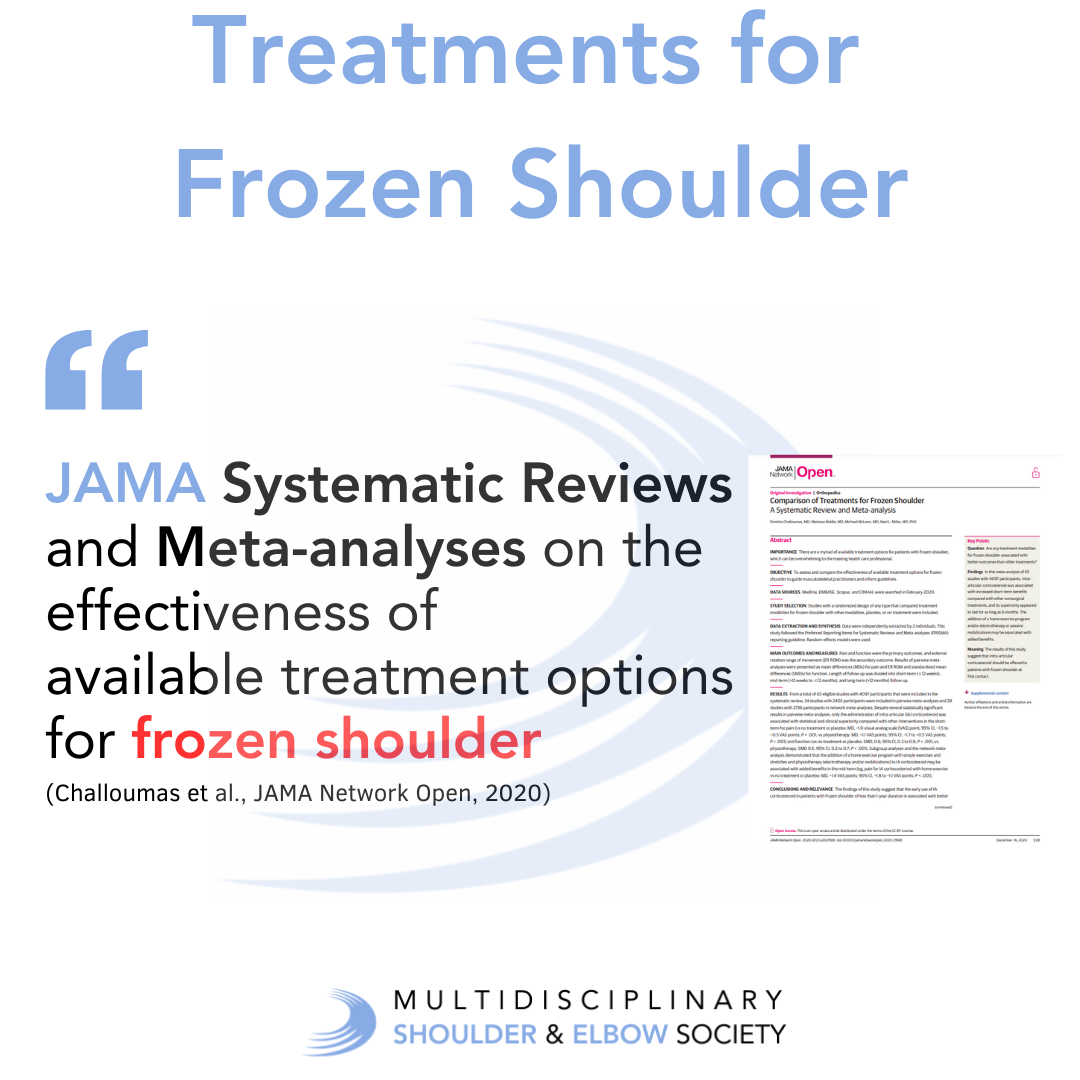
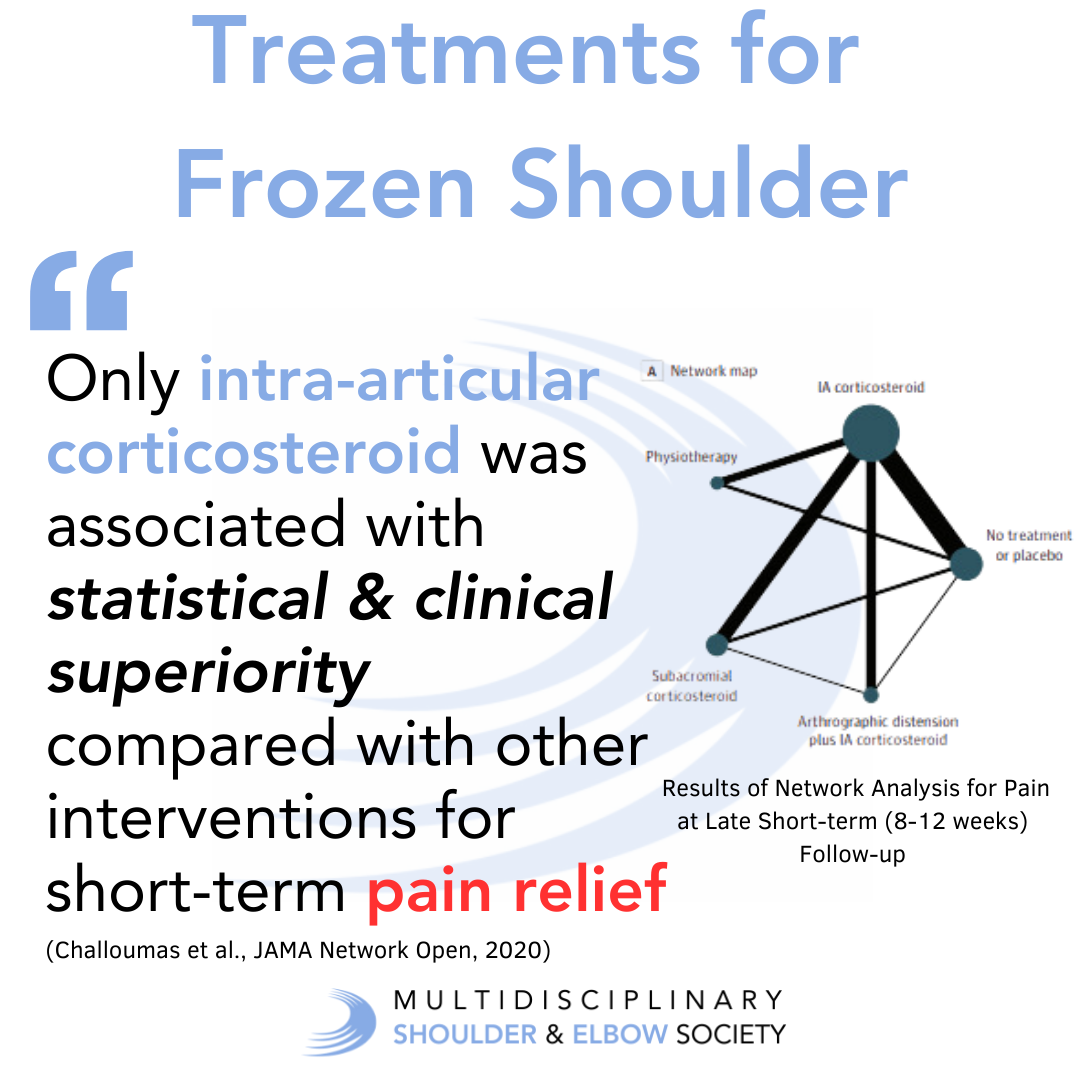
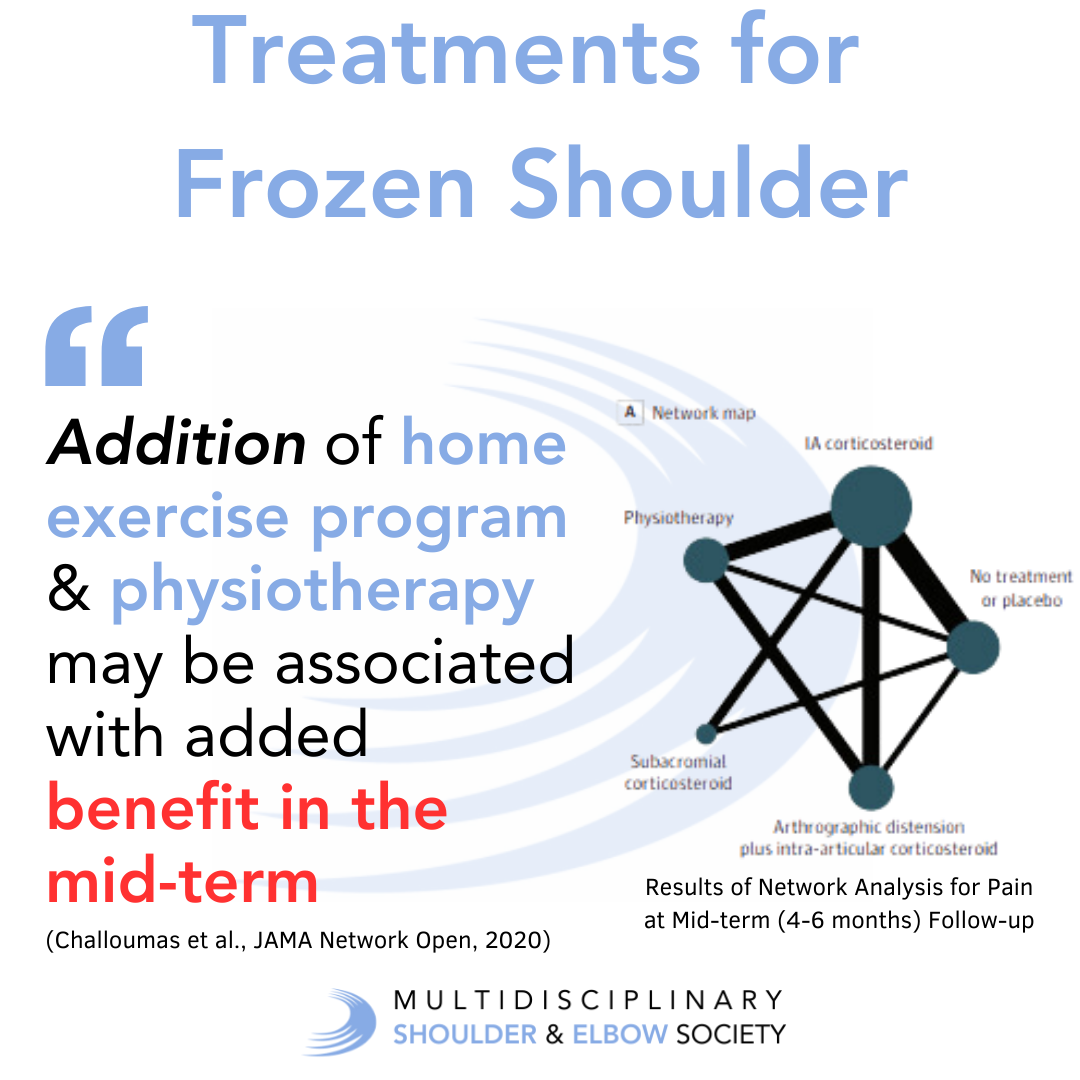
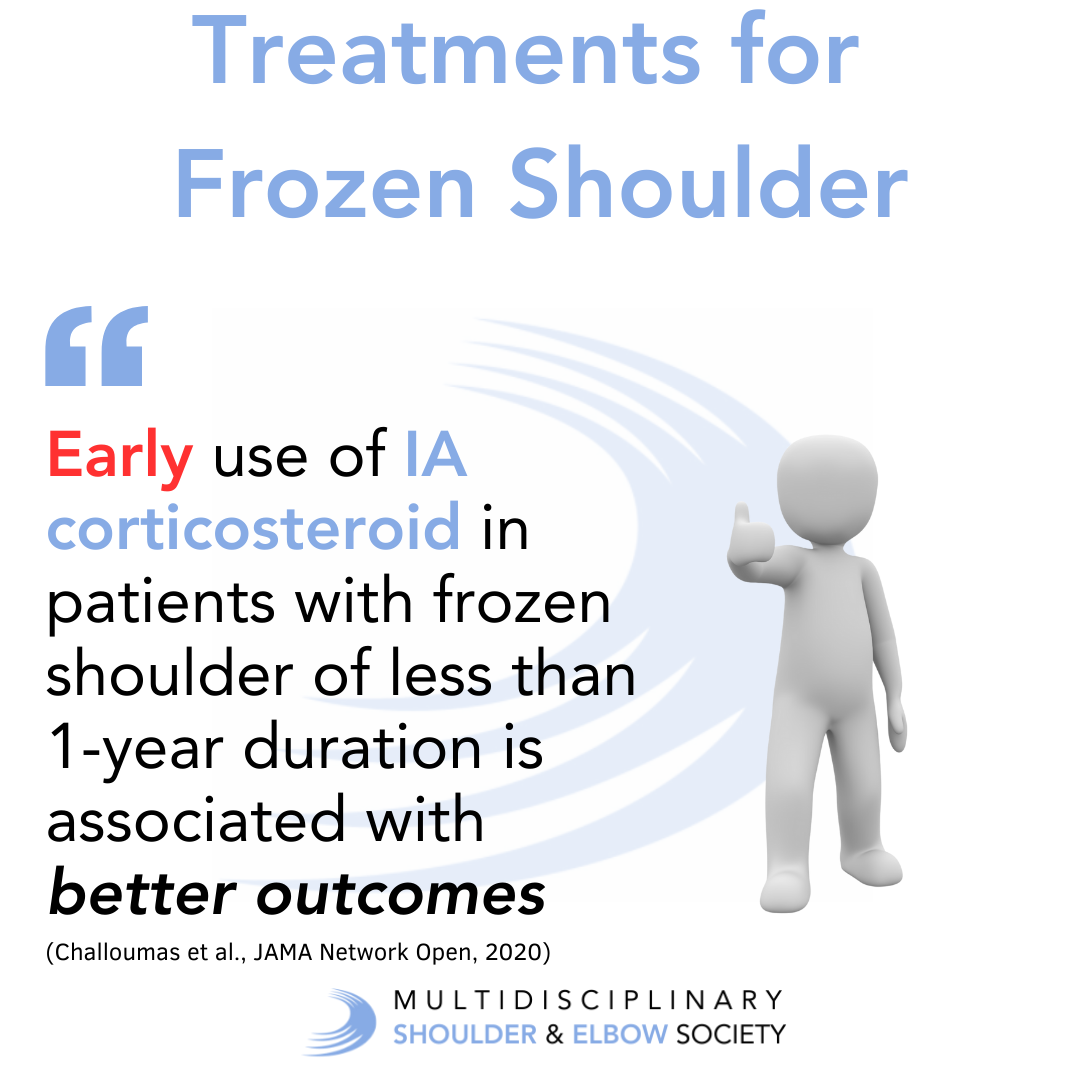
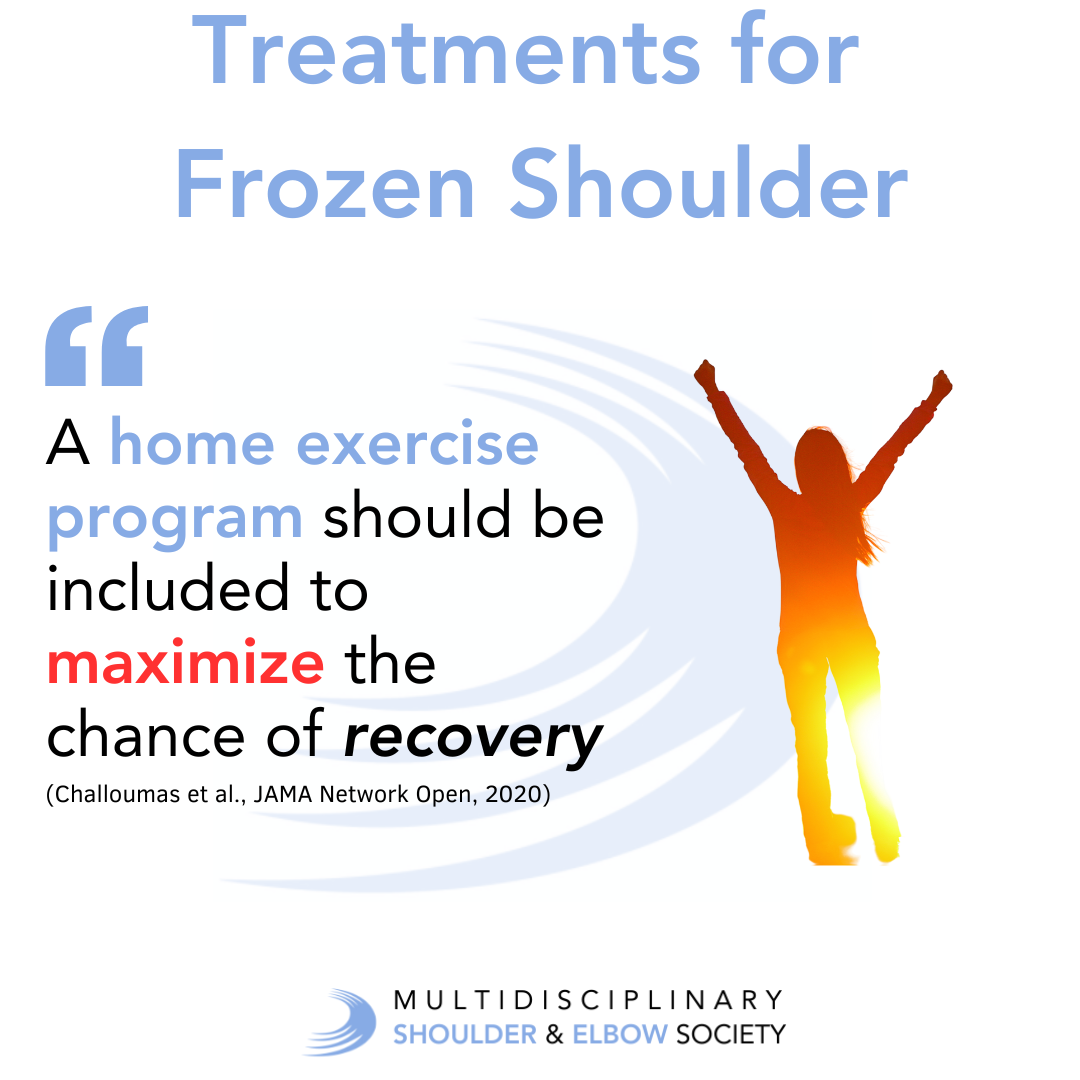
References
- Ewald A. Adhesive capsulitis: a review. Am Fam Physician. 2011;83(4):417-422.
- Challoumas D, Biddle M, McLean M, Millar NL. Comparison of Treatments for Frozen Shoulder: A Systematic Review and Meta-analysis. JAMA Netw Open. 2020;3(12):e2029581. Published 2020 Dec 1. doi:10.1001/jamanetworkopen.2020.29581
- Sun Y, Liu S, Chen S, Chen J. The Effect of Corticosteroid Injection Into Rotator Interval for Early Frozen Shoulder: A Randomized Controlled Trial. Am J Sports Med. 2018;46(3):663-670. doi:10.1177/0363546517744171
- Cho CH, Kim du H, Bae KC, Lee D, Kim K. Proper site of corticosteroid injection for the treatment of idiopathic frozen shoulder: Results from a randomized trial. Joint Bone Spine. 2016;83(3):326-329. doi:10.1016/j.jbspin.2015.06.014
- Oh JH, Oh CH, Choi JA, Kim SH, Kim JH, Yoon JP. Comparison of glenohumeral and subacromial steroid injection in primary frozen shoulder: a prospective, randomized short-term comparison study. J Shoulder Elbow Surg. 2011;20(7):1034-1040. doi:10.1016/j.jse.2011.04.029
- Roh YH, Yi SR, Noh JH, et al. Intra-articular corticosteroid injection in diabetic patients with adhesive capsulitis: a randomized controlled trial. Knee Surg Sports Traumatol Arthrosc. 2012;20(10):1947-1952. doi:10.1007/s00167-011-1776-6
- Yoon SH, Lee HY, Lee HJ, Kwack KS. Optimal dose of intra-articular corticosteroids for adhesive capsulitis: a randomized, triple-blind, placebo-controlled trial. Am J Sports Med. 2013;41(5):1133-1139. doi:10.1177/0363546513480475
- Ryans I, Montgomery A, Galway R, Kernohan WG, McKane R. A randomized controlled trial of intra-articular triamcinolone and/or physiotherapy in shoulder capsulitis. Rheumatology (Oxford). 2005;44(4):529-535. doi:10.1093/rheumatology/keh535
- Carette S, Moffet H, Tardif J, et al. Intraarticular corticosteroids, supervised physiotherapy, or a combination of the two in the treatment of adhesive capsulitis of the shoulder: a placebo-controlled trial. Arthritis Rheum. 2003;48(3):829-838. doi:10.1002/art.10954
- de Jong BA, Dahmen R, Hogeweg JA, Marti RK. Intra-articular methylprednisolone injection in patients with capsulitis of the shoulder: a comparative study of two dose regimens. Clin Rehabil. 1998;12(3):211-215. doi:10.1191/026921598673772620
- Shang X, Zhang Z, Pan X, Li J, Li Q. Intra-Articular versus Subacromial Corticosteroid Injection for the Treatment of Adhesive Capsulitis: A Meta-Analysis and Systematic Review. Biomed Res Int. 2019;2019:1274790. Published 2019 Oct 15. doi:10.1155/2019/1274790
- Chen R, Jiang C, Huang G. Comparison of intra-articular and subacromial corticosteroid injection in frozen shoulder: A meta-analysis of randomized controlled trials. Int J Surg. 2019;68:92-103. doi:10.1016/j.ijsu.2019.06.008
- Pushpasekaran N, Kumar N, Chopra RK, Borah D, Arora S. Thawing frozen shoulder by steroid injection. J Orthop Surg (Hong Kong). 2017;25(1):2309499016684470. doi:10.1177/2309499016684470
- Koraman E, Turkmen I, Uygur E, Poyanlı O. A Multisite Injection Is More Effective Than a Single Glenohumeral Injection of Corticosteroid in the Treatment of Primary Frozen Shoulder: A Randomized Controlled Trial. Arthroscopy. 2021;37(7):2031-2040. doi:10.1016/j.arthro.2021.01.069
- Shah N, Lewis M. Shoulder adhesive capsulitis: systematic review of randomised trials using multiple corticosteroid injections. Br J Gen Pract. 2007;57(541):662-667.
- Jacobs LG, Barton MA, Wallace WA, Ferrousis J, Dunn NA, Bossingham DH. Intra-articular distension and steroids in the management of capsulitis of the shoulder. BMJ. 1991;302(6791):1498-1501. doi:10.1136/bmj.302.6791.1498
- Gam AN, Schydlowsky P, Rossel I, Remvig L, Jensen EM. Treatment of "frozen shoulder" with distension and glucorticoid compared with glucorticoid alone. A randomised controlled trial. Scand J Rheumatol. 1998;27(6):425-430. doi:10.1080/030097498442264
- Kim SJ, Park JM, Song J, Yoon SY, Shin JI, Lee SC. High- versus Low-dose Steroid Injection for Adhesive Capsulitis (Frozen Shoulder): A Systematic Review and Meta-analysis. Pain Physician. 2023 Sep;26(5):437-447. PMID: 37774178.
